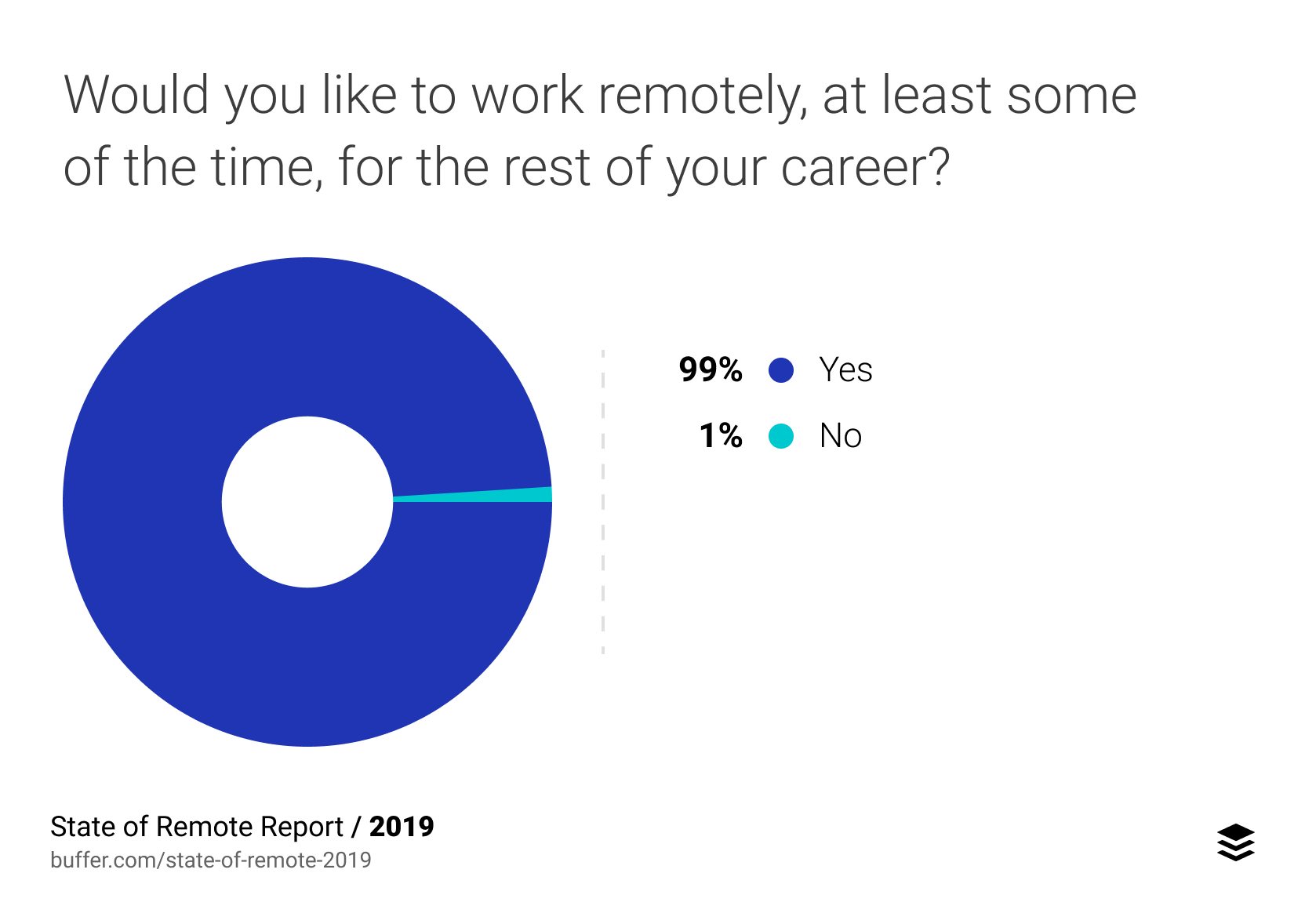Remote working and its impact on expats

Remote working has been around for many years and, when offered and supervised, it seems to be working both for the employees and their employers alike. But in the context of the global crisis that we are living now, working from home has become a new norm, even for businesses that had not considered it an option so far.
For companies, remote working is an opportunity to change their way of sustainable working. The medium to long term benefits are: less office space, less commuting, fewer business trips, shorter breaks and greater focus for employees. Feedback from the market seems to indicate that remote workers are also less likely to take short absences due to illness.
A report by website Buffer shows that 99% of the questioned employees would choose to do their jobs remotely, if given the opportunity.
"Walking the dogs instead of commuting, that mid-morning gym session, the freedom to catch up with friends and not having to schedule time off for appointments. These are just some of the ways remote workers can enjoy a flexible schedule. Forty percent of respondents rate this is the biggest benefit of remote work."

For expats, remote working has opened a world of possibilities, allowing them to find work while living in a new country where they don't speak the language well enough yet, or to be able to travel as often as they want, visit their family, friends, or just visit the world while having an income (nomad workers).
The world crisis caused by the coronavirus epidemic, has forced many companies to adapt fast to remote working in order to maintain their productivity. On a larger scale, besides having a major impact in the life quality of the employees, this type of work offers companies the flexibility to deal with such unexpected events in the future.
The future of remote working, an asset to attract the best talents
In the last months, the situation in the economic world has completely changed, and many see the world post coronavirus crisis as one where remote working becomes the norm. In general, the current consensus is that, based on positive experiences with flexible working, as well as supporting IT infrastructure investments, employees will demand more flexibility and business leaders will be more open to the concept.
Arabian Business says that in the UAE, where expats comprise 90% of the working population, many employers are likely to have a more positive attitude towards working from home, particularly in light of pressure to reduce costs in a global recession. It isn't beyond imagination that employees, particularly expats, will expect more flexibility with regard to place of work after the crisis.
While some companies may perceive this development as problematic, others will embrace it. These companies will go beyond allowing staff to work from other countries and may offer remote working as an incentive to hire the best talent. For example, it can be particularly effective in the digital sector, where workforce can be expensive and difficult to attract.
For employers, cross-border implications and prerequisites may be substantial when taking into consideration tax and labour laws in different markets. Employers will also need to evaluate how talent will be identified and managed across borders. This will not be an easy task to accomplish, rather a long journey, but for organizations that see adaptive working as a valuable element in their work environment, this is a journey they'll have to embark on.
For the UAE specifically, with its high expat population, enhanced remote working is likely to have a larger international angle than in other countries and will have implications for government policy as well. Dubai has already embraced the trend by issueing a special "Virtual Visa" that allow applicants to reside in Dubai whilst still working remotely for another country (to know more about changes in Dubai and the Emirates, see our article: Sharia becomes more flexible in Dubai to entice foreigners)
Issues to consider on the legal side of remote working
For many people, the concept of remote working has become a life choice and their careers are based on this concept. But some employees are doing their remote work from other countries, and they are keeping it secret. This has been going on for many years, since remote working became an option, but it has become more common in the pandemic, with so many people working from home. In addition, individuals who apply for a remote job do not always tell their employers where they are. This might be because they prefer not to prompt objections or because they don't think working from another jurisdiction might be a concern for their employer.
In the UK and in the European Union every employee must be given a document confirming their normal place of work. If the normal place of work changes, that must also be confirmed in writing by the employer. However, mobile and home workers are often given employment contracts that are not very clear about where "home" could be, or about the need to promptly inform their employer of a change of address. In the rush to send people home at the start of lockdown, many employers failed to confirm the detail clearly in writing.
For the employer it is difficult to fulfil their health and safety responsibilities without knowing where work is being done. There are many things to take into consideration, such as immigration rules, employment law, payroll tax, corporation tax, social security, medical cover, insurance, IT licensing, employee registration and other compliance concerns. (Find out more on this topic here.)
For the employee these facts don't represent a problem, and if they are not aware that they might be causing difficulties to their employer, they don't even bring them up. With global travel restrictions in place, most employees decided to continue to work in their host countries. However, some have decided to work from abroad during this time, with the help of the technology and a good Internet connection. Some remote working expats were visiting their families in their home countries when the Covid-19 lockdown started, and decided to stay put. Others went back home during or after the lockdown, not knowing how much longer it will last.
For most of them, working remotely from another country didn't raise any problems in terms of work quality. From a client-delivery perspective things are working well, and employers don't even notice the employee is no longer in the country. So it should be up to the company to make sure that there's a good communication and all the aspects regarding the regulations of remote working are very clear for everyone.
Flexible working (sometime also called hybrid working) including a remote part, has its ups and downs, but seems to be working for most people, at least to some extend. Leaving aside the areas where physical interaction is needed, businesses have embraced this type of work and are adapting on the go to make it work even better. Although we are still dealing with the pandemic and outcomes remain difficult to predict, an increase in demand for more cross-border remote working is a realistic scenario. Employers are starting to consider the post Covid-19 reality and plan for successful adaptation. It looks like home working is here to stay.
Share your experience, participate in the discussion and leave comments in our forum HERE.
I am passionate about life. Nature, people, art and everything that is making its magic on this beautiful planet, is worth our attention. I believe that communication is the key of life and wellbeing and I am a content writer for EasyExpat.com